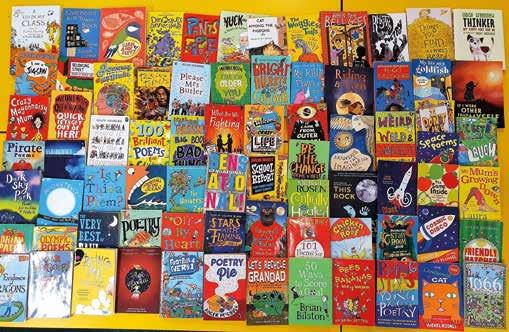
2 minute read
Giving poetry a platform
POETRY can sometimes feel like the poor relation when it comes to teaching English in primary schools.
You might overhear the year 3 team talking in the staffroom about the infamous “annual poetry unit” that’s usually squeezed into the last week of an extremely busy term. Or year 6 teachers swapping “fantastic” poetry comprehension activities to support those key marginals in the run-up to SATs. There might even be an assembly to celebrate National Poetry Day where overworked teachers are literally selecting poems to read out on their way into the hall.
However, if we want our pupils to have a genuine appreciation of poetry, of the joy it can bring, of how it teaches us to play with language, of the way it allows us to express our emotions, of how it is often a gateway into reading for pleasure, then it needs to be embedded into the school culture. It’s not easy, admittedly, with the ever-increasing pressures on the timetable, but it’s worth prioritising.
At Moorlands, almost every class now runs Poem of the Day, where children volunteer, individually, with a partner or in a small group, to choose and share a poem with the class. If staff and the more confident pupils lead the way over the first week or two, it quickly becomes self-sustaining. We’ve even had children writing poems at home to perform to their peers.
It often takes a couple of months for some children to find the courage to read out a poem, but watching the boost to their self-confidence afterwards is worth the wait. Once a week, the pupils disappear off to read their poems to different classes so it becomes a whole-school event.
Give your young poets an audience
It’s also essential for children to recognise that poetry can be created by everyone. One of the most important things to do is make sure that pupils’ poems are performed or published and not just lingering in an exercise book. Share them with parents in assembly, get them on the school website, print them out and stick them up round the school. Give them an audience and show the children they’re being read. Each term, we distribute a few exercise books (pictured left) around the school – in the library, our reading shed, the dining hall, etc – along with a selection of colourful pens. Pupils then have the opportunity to write poetry in the books during their free time. At the end of the term, the books are all put in the library for everyone to enjoy. The fact that the children know their work is going to be read by their peers gives them a real purpose for their writing.
Enthusiasm about poems is infectious so find a couple of poetry books that you enjoy and share favourite poems with the children.
Find the ones that move you, interest you and amaze you. Is there some time in the week to squeeze in a bit of extra poetry writing? Teach them about fun poems, such as lipograms, where a certain letter has to be omitted from the writing, and N+7 poems, where the children select a favourite poem, highlight the nouns and replace them with the nearest noun that’s seven words further on in the dictionary. Get them writing poems together as a class. ‘Ten things my teacher would never say’ is always guaranteed to produce laughs. Set them the challenge of the Three Minute Poem, where the only rule is that nobody, adults included, can stop writing for three minutes. Pair them up with a collection of poetry books and a pile of sticky notes to jot down their thoughts. It may take time to demonstrate how enjoyable, powerful and inclusive poetry is, but creating a class of poetry enthusiasts is enormously rewarding. @jonnybid
Read
Do you have a book to review?
Send us your suggested books for children and young people with inclusivity at their heart to educate@neu.org.uk





